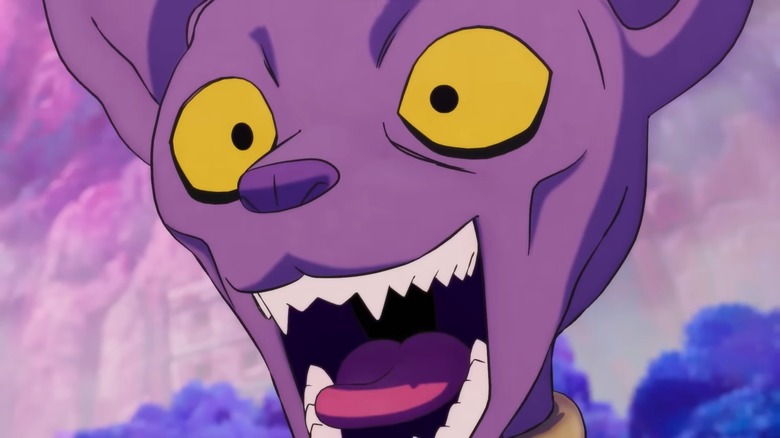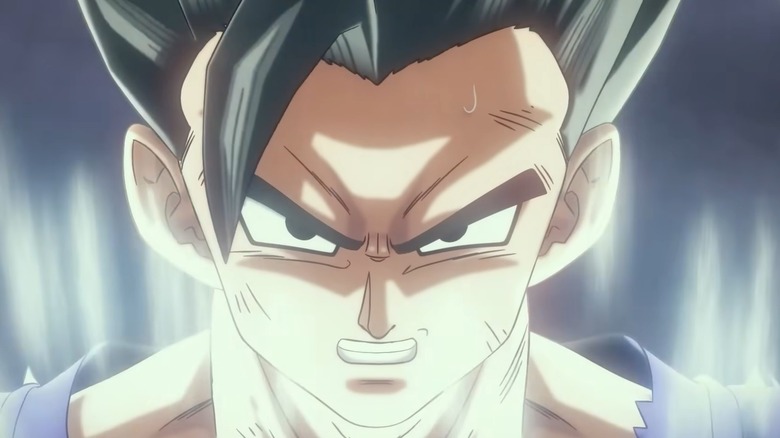Why Dragon Ball Super: Super Hero Dominated The Box Office
This weekend brought the surprising news that the number one box office hit in America is a Japanese anime feature film. The movie in question is "Dragon Ball Super: Super Hero," based on the long-running and enormously popular "Dragon Ball" franchise, and the 21st feature film in the "Dragon Ball" saga overall.
On August 21, The Hollywood Reporter announced that "Dragon Ball Super: Super Hero" is the number one movie in the country, and according to its distributor Crunchyroll, its opening weekend haul of $20 million+ is enough to make it the best global box office debut in history for a Japanese anime movie. That opening sees the movie in more than 3,100 theaters across North America, as the film handily beats out its major new release competition like the thriller "Beast," which sees Idris Elba fighting off a lion, and slightly older releases like "Bullet Train" starring Brad Pitt.
No one can ever know for sure why a movie rockets to the top of the box office, as "Dragon Ball Super: Super Hero" has done, but there are a few factors at play here in making this dream for anime fans come true.
The movie faced little competition during a light weekend
One advantage that "Dragon Ball Super: Super Hero" had is that even though we're still technically in the summer blockbuster season, competition was light heading into the weekend with only one major new release: "Beast" starring Idris Elba, which took in a relatively modest $10 million. The Hollywood Reporter called that a "disappointing start," but on the upside for anime fans, this did allow "Dragon Ball Super: Super Hero" to take the top slot and make anime history in the process.
Both "Dragon Ball Super: Super Hero" and "Beast" were targeted toward similar audiences: While "Beast" reportedly skewed 56 percent male in its proportion of opening weekend ticket buyers, the audience for "Super Hero" was significantly more so at almost 80 percent male. The film was also a success among that ever-important younger demographic, as 70 percent of its opening weekend audience were reportedly between the ages of 18 and 35. If you know anything about the appeal of the "Dragon Ball" franchise, and particularly the age of fans who remember watching "Dragon Ball Z" on television in the late 90s and early 2000s, that shouldn't come as a surprise — and in fact, much of the film's current success might well be attributed to that age group's nostalgia for the now-classic animated series.
Nostalgia for Dragon Ball Z is likely a key factor in the movie's success
The beloved Japanese anime "Dragon Ball Z" first hit American TV in 1996, according to PC Mag, which means that many who grew up watching the series are now old enough to have children of their own. Nostalgia is a powerful force, and it's impossible to discount it when "Dragon Ball Super: Super Hero" has done so well with such a wide release in theaters.
The nostalgic appeal of "Dragon Ball Super: Super Hero" was no surprise, nor was it an accident. Speaking to Showbiz Cheat Sheet to promote the film, members of its English language voice cast like Zach Aguilar, Jason Marnocha, and Sean Schemmel spoke about this very thing, and even how they themselves were delighted to come on board the film as childhood fans of "Dragon Ball Z." As explained by Aguilar, who voiced Dr. Hedo in the movie, "It's been so surreal. Growing up, watching the show ... I watched it in middle school [...] At every stage of the process, I would say constantly, I've had to pinch myself, like, 'Am I dreaming? Is this actually real? Am I actually a part of Dragon Ball?'"
Marnocha, who plays Carmine, had a similar experience. "I'm kind of in a similar boat," the actor said. "You know, I grew up watching Dragon Ball Z and things like that. So, I had an understanding of this world and the Red Ribbon Army and these characters and things going in, which I don't usually have."
When the cast of a movie has such nostalgic feelings for its source material, one hopes the audience will, too. If the film's box office performance is any indication, those designs were a resounding success.


